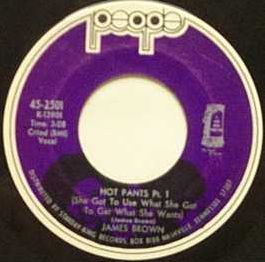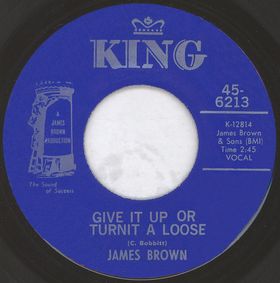
Funk is a music genre that originated in African-American communities in the mid-1960s when musicians created a rhythmic,danceable new form of music through a mixture of various music genres that were popular among African-Americans in the mid-20th century. It deemphasizes melody and chord progressions and focuses on a strong rhythmic groove of a bassline played by an electric bassist and a drum part played by a percussionist,often at slower tempos than other popular music. Funk typically consists of a complex percussive groove with rhythm instruments playing interlocking grooves that create a "hypnotic" and "danceable" feel. It uses the same richly colored extended chords found in bebop jazz,such as minor chords with added sevenths and elevenths,and dominant seventh chords with altered ninths and thirteenths.

Clyde Austin Stubblefield was an American drummer best known for his work with James Brown,with whom he recorded and toured for six years (1965-70). His syncopated drum patterns on Brown's recordings are considered funk standards. Samples of his drum performances were heavily used in hip hop music beginning in the 1980s,although Stubblefield frequently received no credit.

The Winstons were an American funk and soul music group based in Washington,D.C. They are known for their 1969 recording featuring a song entitled "Color Him Father" on the A-side,and "Amen,Brother" on the B-side. Halfway into "Amen,Brother",there is a drum solo which would cause the release to become the most widely sampled record in the history of electronic music. Sampled audio clips of the drum solo became known as the Amen break,which has been used in thousands of tracks in many musical genres,including breakcore,drum and bass,hip hop,jungle,big beat and industrial.

"Say It Loud –I'm Black and I'm Proud" is a funk song performed by James Brown,and written with his bandleader Alfred "Pee Wee" Ellis in 1968. It was released as a two-part single,which held the number-one spot on the R&B singles chart for six weeks,and peaked at number ten on the Billboard Hot 100. Both parts of the single were later included on James Brown's 1968 album A Soulful Christmas and on his 1969 album sharing the title of the song. The song became an unofficial anthem of the Black Power movement.

John Henry "Jabo" Starks,sometimes spelled Jab'o,was an American funk and blues drummer best known for playing with James Brown as well as other notable musicians including Bobby Bland and B.B. King. A self-taught musician,he was known for his effective and clean drum patterns. He was one of the originators of funk drumming,and is one of the most sampled drummers.
"Soul Power" is a song by James Brown. Brown recorded it with the original J.B.'s and it was released as a three-part single in 1971. Like "Get Up Sex Machine" and other hits from this period it features backing vocals by Bobby Byrd. It charted #3 R&B and #29 Pop.
Jimmy Nolen was an American guitarist,known for his distinctive "chicken scratch" lead guitar playing in James Brown's bands. In its survey of "The 100 Greatest Guitarists of All Time," the English magazine Mojo ranks Nolen number twelve. Rolling Stone named Nolen the 12th greatest guitarist of all time in 2023.
"Cold Sweat" is a song performed by James Brown and written with his bandleader Alfred "Pee Wee" Ellis. Brown recorded it in May 1967. An edited version of "Cold Sweat" released as a two-part single on King Records was a No. 1 R&B hit,and reached number seven on the Pop Singles chart. The complete recording,more than seven minutes long,was included on an album of the same name.

"Mother Popcorn (You Got to Have a Mother for Me)" is a song recorded by James Brown and released as a two-part single in 1969. A #1 R&B and #11 Pop hit,it was the highest-charting of a series of recordings inspired by the popular dance the Popcorn which Brown made that year,including "The Popcorn","Lowdown Popcorn",and "Let a Man Come In and Do the Popcorn". The "mother" of the song's title was,in the words of biographer RJ Smith,"[Brown's] honorific for a big butt".

"The Grunt" is a funk instrumental recorded in 1970 by James Brown's band The J.B.'s. It was released as a two-part single on King. It was one of only two instrumental singles recorded by the original J.B.'s lineup with Bootsy and Catfish Collins. Large parts of "The Grunt"'s melody and arrangement are borrowed,uncredited,from The Isley Brothers' song "Keep on Doin'",which was released earlier in the same year.

"Hot Pants (She Got to Use What She Got to Get What She Wants)" is a 1971 song by American singer James Brown,released as a single on his People Records label (then distributed by King Records) in July of that year with "Pt. 1" on the A-side and "Pt. 2 and 3" on the B-side. It was a number-one hit on the Billboard R&B chart,and reached number fifteen on the Hot 100 and number ten on the Cashbox magazine charts. "Hot Pants" was Brown's final release under King's purview before he and the People label moved to Polydor Records.

"Give It Up or Turnit a Loose" is a funk song recorded by James Brown. Released as a single in 1969,the song was a #1 R&B hit and also made the top 20 pop singles chart. "Give It Up or Turnit a Loose" appeared as an instrumental on the Ain't It Funky (1970) album,removing Brown's vocals and adding guitar overdubs,while the vocal version was released on It's a New Day –Let a Man Come In (1970).

"I Got the Feelin'" is a funk song by James Brown. Released as a single in 1968,it reached No. 1 on the R&B chart and #6 on the pop chart. It also appeared on a 1968 album of the same name.

"Doing It to Death",also known as "Gonna Have a Funky Good Time",is a funk song recorded by The J.B.'s featuring James Brown. A 10-minute,two-part version of "Doing It to Death" was included on a J.B.'s album of the same name. The complete,unedited and nearly 13-minute-long original recording of the song was first issued on the 1995 J.B.'s compilation Funky Good Time:The Anthology. Performances of the song also appear on the albums Live at Chastain Park and Live at the Apollo 1995.

"My Thang" is a funk song written and recorded by James Brown. Unlike most of his songs,this song was released not as a two-part single,but instead issued with three different B-sides. It spent two weeks at number one on the R&B singles chart - Brown's second #1 in a row,following "The Payback" - and reached No. 29 on the Billboard Hot 100 in July 1974. The song also appeared on Brown's 1974 double album Hell.

Michel'le is the debut studio album by American singer Michel'le. It was released on October 23,1989,on Ruthless Records,Atco Records and Atlantic Records. The album was co produced by Dr. Dre of N.W.A and André“LA Dre”Bolton. The album was certified Gold by the Recording Industry Association of America five weeks after its release.

Aretha is the thirty-first studio album by American singer Aretha Franklin,released on October 27,1986,by Arista Records. It is the third album with the Aretha title to be released by Franklin,following her 1961 album and 1980 album.

Through the Storm is the thirty-second studio album by American singer Aretha Franklin. It was released on April 1,1989,by Arista Records.

In sound and music,sampling is the reuse of a portion of a sound recording in another recording. Samples may comprise elements such as rhythm,melody,speech,or sound effects. A sample can be brief and only incorporate a single musical note,or it can consist of longer portions of music,and may be layered,equalized,sped up or slowed down,repitched,looped,or otherwise manipulated. They are usually integrated using electronic music instruments (samplers) or software such as digital audio workstations.
"King Heroin" is an anti-drug song by James Brown,David Matthews,Manny Rosen and Charles Bobbit. Brown recorded this poem set to music at a studio in New York with session musicians in January 1972 and released it as a single in March. It was his fifth single for Polydor Records and reached number six on the U.S. Hot Soul Singles chart and number 40 on the Billboard Hot 100 in the spring. The song was included on Brown's 1972 album There It Is.

















